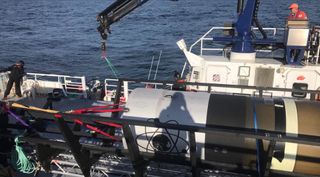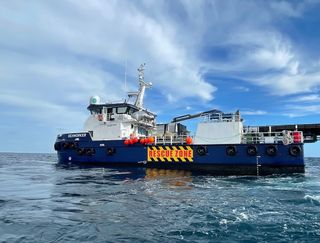
Rocket Lab had another productive fishing trip.
One of the company's two-stage Electron rockets successfully launched two commercial Earth-observing satellites to orbit on Wednesday (Nov. 17) from Rocket Lab's New Zealand site, on the North Island's Mahia Peninsula.
During that mission, the booster's first stage came back to Earth for a controlled, parachute-aided splashdown in the Pacific Ocean, a few hundred miles off the New Zealand coast. A recovery boat quickly moved in to haul the space-flown hardware out of the sea and back to terra firma, as photos of the operation show.
Related: Rocket Lab and its Electron booster (photos)

"Welcome home, Electron," Rocket Lab said via Twitter on Thursday (Nov. 18), in a post that featured two pictures of the booster secured to the recovery ship.
Rocket Lab is working to make the first stage of the 59-foot-tall (18 meters) Electron rocket reusable, to increase flight rates and cut costs for the company and its customers. The company has now recovered three Electron boosters during orbital missions, both to practice the required operations and to study how the hardware holds up during reentry to Earth's atmosphere.
Rocket Lab's ultimate plan calls for a helicopter to pluck falling Electron first stages out of the sky, and Wednesday's recovery took a big step in that direction. For the first time, the company stationed a chopper in the recovery zone to track the booster as it descended and perform communications tests.
Get the Space.com Newsletter
Breaking space news, the latest updates on rocket launches, skywatching events and more!
"This is our third successful proof of concept recovery mission and further cements Electron as the leading launch vehicle for the small satellite market," Rocket Lab founder and CEO Peter Beck said in a post-launch statement. "We are all excited to move onto the next phase of reusability next year: catching Electron in the air with a helicopter."
Wednesday's launch was the 22nd overall for Electron and its fifth of the year. The two satellites the rocket delivered to orbit are part of the company BlackSky's Earth-observing constellation. Rocket Lab will loft a total of four more BlackSky satellites on two missions in the near future.
Mike Wall is the author of "Out There" (Grand Central Publishing, 2018; illustrated by Karl Tate), a book about the search for alien life. Follow him on Twitter @michaeldwall. Follow us on Twitter @Spacedotcom or on Facebook.
Join our Space Forums to keep talking space on the latest missions, night sky and more! And if you have a news tip, correction or comment, let us know at: community@space.com.

Michael Wall is a Senior Space Writer with Space.com and joined the team in 2010. He primarily covers exoplanets, spaceflight and military space, but has been known to dabble in the space art beat. His book about the search for alien life, "Out There," was published on Nov. 13, 2018. Before becoming a science writer, Michael worked as a herpetologist and wildlife biologist. He has a Ph.D. in evolutionary biology from the University of Sydney, Australia, a bachelor's degree from the University of Arizona, and a graduate certificate in science writing from the University of California, Santa Cruz. To find out what his latest project is, you can follow Michael on Twitter.
